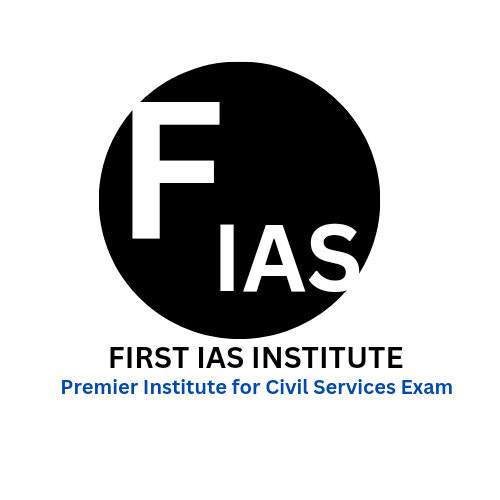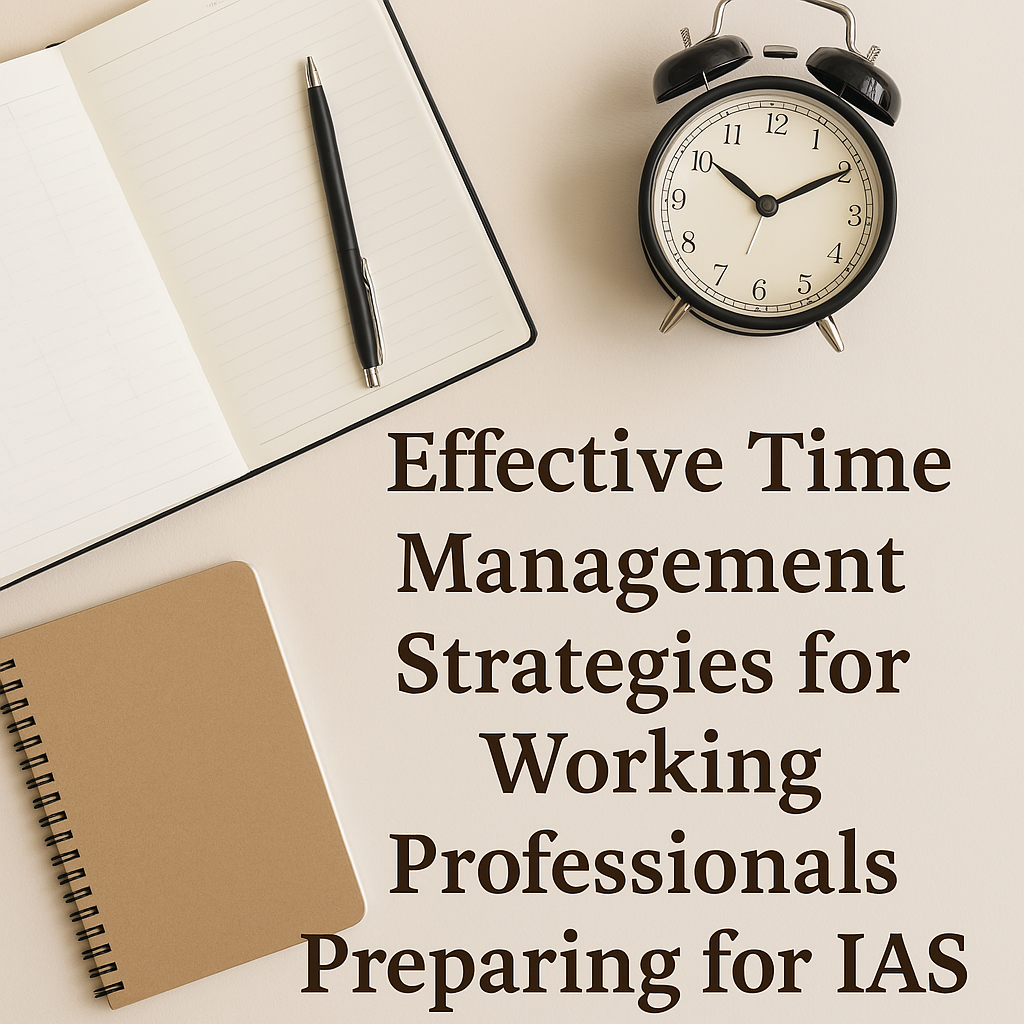Effective Time Management Strategies for Working Professionals Preparing for IAS
Preparing for the prestigious Indian Administrative Services (IAS) exam is no small feat, especially for working professionals who juggle demanding job responsibilities along with study schedules. The Union Public Service Commission (UPSC) Civil Services Examination (CSE) is not only one of the most competitive exams in the country but also one that demands dedicated and consistent preparation over a long period.
For working individuals, the biggest challenge lies in time management — efficiently allocating limited hours to cover a vast syllabus, stay updated with current affairs, revise thoroughly, and still manage personal and professional responsibilities. However, with the right approach and commitment, it is absolutely possible to clear the IAS exam while continuing to work full-time.
This blog provides practical, effective time management strategies and schedules specifically tailored for working professionals who aspire to crack the IAS exam.
Join WhatsApp community for Free Notifications, Updates, Study Material, Mock Tests, Internship Updates, and Current Affairs - CLICK HERE TO JOIN
Understand the UPSC Exam Structure First
Before diving into time management tips, it’s essential to understand the structure of the UPSC CSE:
- Preliminary Examination – Objective type (General Studies Paper I and CSAT Paper II)
- Main Examination – Descriptive type (9 papers including optional subject)
- Personality Test – Interview
The vastness of the syllabus makes planning crucial. Knowing what to study and how much time to dedicate is the first step in building a smart preparation strategy.
1. Set Clear and Achievable Goals
Having clarity on your goals keeps your preparation focused. Break your UPSC goal into smaller milestones:
- Monthly goals (e.g., complete Indian Polity and Economy basics)
- Weekly goals (e.g., finish Laxmikant chapters 1–10)
- Daily goals (e.g., read 20 pages of a standard book and current affairs for 30 minutes)
Keep your goals realistic and measurable, considering your work hours.
To Enroll in FIRST IAS INSTITUTE - Click Here
2. Create a Personalized Daily Schedule
Your schedule should revolve around your work commitments. Most working professionals have about 3–5 hours on weekdays and more time on weekends.
Here’s how to allocate your time effectively:
- Early Morning (5:00 AM – 8:00 AM): Best time for focused study. Use it for reading important topics from standard books.
- Commute Time: Listen to audio notes, current affairs podcasts, or watch lectures (if you commute by public transport).
- Evening (8:00 PM – 10:00 PM): Revise what you studied in the morning and go through current affairs or mock questions.
- Weekend (Saturday & Sunday): Utilize up to 8–10 hours effectively — take mock tests, complete difficult topics, and revise.
Your schedule should be flexible enough to adjust to unpredictable work demands.
3. Prioritize High-Yield Topics
Given the limited time, you must focus on topics that carry more weight in the exam. For example:
- For Prelims, focus on Polity, Economy, Environment, History, and Current Affairs.
- For Mains, emphasize answer writing, Ethics, and your Optional subject.
Don’t aim to study everything — aim to master key subjects that frequently appear in the exams.
4. Use Weekends Smartly
Weekends are your best opportunity to catch up on your studies:
- Take full-length mock tests on Saturday morning.
- Dedicate time to optional subject preparation or practicing essay writing.
- Use Sundays for weekly revision and planning for the upcoming week.
- If possible, attend weekend online coaching classes or discussion forums.
Make sure to balance study with relaxation to avoid burnout.
Join WhatsApp community for Free Notifications, Updates, Study Material, Mock Tests, Internship Updates, and Current Affairs - CLICK HERE TO JOIN
5. Leverage Technology and Online Resources
Working professionals must use their smartphones and gadgets as study tools:
- Use apps like Evernote, Notion, or Google Keep to take notes.
- Subscribe to YouTube channels for short, quality UPSC lectures.
- Listen to All India Radio News, The Hindu audio summaries, or PIB summaries during commute or breaks.
- Use current affairs apps that offer daily quizzes and news analysis.
This not only helps you stay updated but also maximizes the productivity of your idle time.
6. Practice Answer Writing in Short Intervals
Answer writing is crucial for Mains. However, you don’t need hours every day for practice:
- Set a target to write one answer a day during the week.
- Use weekends to write two to three full answers or essays.
- Evaluate your answers using toppers’ copies and improvement tips from mentors or forums like Reddit, Telegram groups, or coaching portals.
Over time, your writing speed and quality will improve.
To Enroll in FIRST IAS INSTITUTE - Click Here
7. Make Revision a Weekly Habit
UPSC demands retention of information, and revision is key to that.
- Use Sundays for weekly revision — go through everything you studied that week.
- Maintain a revision diary to jot down key facts, figures, and tricky concepts.
- Set aside one week every month for complete revision of important subjects.
Frequent revision prevents forgetting and builds confidence.
8. Stay Consistent and Avoid Burnout
Even if you have only 3–4 hours a day, consistency matters more than quantity. Skipping days can lead to backlogs and guilt.
Tips to stay consistent:
- Keep your study corner organized and distraction-free.
- Take short breaks to prevent fatigue.
- Practice meditation or exercise to reduce stress.
- Remind yourself of your motivation for joining civil services.
Avoid the temptation to quit your job early — financial stability and professional discipline often help in long-term preparation.
9. Use Leaves and Holidays Strategically
If your job allows paid leaves or sabbaticals, utilize them wisely:
- Take leave 1–2 months before Prelims or Mains for intensive preparation.
- Use long weekends for mock test series or optional subject marathons.
- Plan your preparation around the UPSC calendar so you never feel underprepared.
If needed, consider taking a break or switch to less demanding roles closer to the exam.
Join WhatsApp community for Free Notifications, Updates, Study Material, Mock Tests, Internship Updates, and Current Affairs - CLICK HERE TO JOIN
10. Join a Study Group or Online Forum
Staying in touch with fellow aspirants helps:
- Keeps you accountable and motivated.
- Helps clear doubts quickly.
- Encourages sharing of notes and resources.
Look for Telegram channels, WhatsApp groups, or local weekend study groups for peer interaction.
However, avoid wasting time in too much discussion or irrelevant debates.
11. Take Care of Your Physical and Mental Health
Working and preparing simultaneously can be draining. It’s essential to take care of your body and mind:
- Sleep at least 6–7 hours daily.
- Eat healthy and stay hydrated.
- Take breaks and indulge in hobbies.
- Avoid comparison with full-time aspirants.
Your health is your foundation — without it, even the best study plan won’t succeed.
To Enroll in FIRST IAS INSTITUTE - Click Here
Final Thoughts: You Can Do It!
Clearing the IAS exam while working full-time is not just possible — it has been done by many successful candidates. What sets them apart is their strategic planning, disciplined execution, and unwavering focus.
Don’t let your job feel like an obstacle — instead, treat it as a training ground for time management, stress handling, and real-world exposure. These are qualities the civil services deeply value.
Keep reminding yourself why you started, and let that motivation power you through the toughest days.
Quick Recap of Key Strategies:
- Set realistic daily, weekly, and monthly goals.
- Follow a fixed morning and evening study schedule.
- Prioritize key subjects and topics.
- Maximize your weekends for mock tests and revision.
- Use technology for learning on-the-go.
- Practice answer writing consistently.
- Revise regularly to retain information.
- Stay consistent and avoid burnout.
- Use leaves and holidays wisely.
- Stay healthy and mentally balanced.
With the right mindset and strategies, you can balance your job and UPSC preparation effectively and make your IAS dream come true.
If you’d like a customized study plan or want help selecting resources, feel free to ask. You're not alone in this journey — let’s plan smart and work hard!


 firstiasofficial@gmail.com
firstiasofficial@gmail.com
Leave a Comment